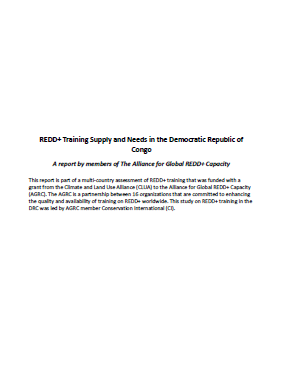REDD+ Training Supply and Needs in the Democratic Republic of Congo
Summary
This study aims to assess current REDD+ training supply and demand in the Democratic Republic of Congo (DRC), and to identify training needs and gaps. A sample of nine training providers was included in the study, participating through an online survey and/or a telephone interview. The overall conclusion is that the supply of REDD+ training does not yet meet the demand in the DRC. This report describes recent training activity in the country and highlights some of the priorities for future REDD+ training initiatives.
Respondents described more than 14 different training initiatives that conducted at least 80 separate events between January, 2010 and May, 2012. These were targeted primarily at the staff of government agencies, non-governmental organizations, organizations developing REDD+ projects, and to local communities. In-person training events were the most widely used format, were thought to have reached the greatest number of people, estimated at 2500. Posters and flyers were thought to have reached nearly 2000 people, and other training formats were believed to have reached far smaller numbers of people.
A wide range of thematic areas were covered through these initiatives. The most commonly cited topics included the basic elements of climate change science, the REDD+ readiness process and policy, social and environmental safeguards, and the drivers of deforestation and degradation. The majority of training events were held in Kinshasa (48), though at least 31 were held in 16 other cities around the country.
All interviewees indicated that there is a need for additional investment in REDD+ training in the DRC. They indicated that the highest priority is to train government representatives at alllevels, but also NGO’s, local communities and private sector REDD+ project developers.
A majority of the interviewees indicated that additional and more in-depth training is needed on safeguards, the rights of indigenous peoples, land tenure, and gender equity. Some of the respondents indicated a need to expand the supply of in-depth training on subjects that have so far been covered only at an introductory level.
Respondents indicated that much of the demand for additional training is in the interior of the country, in cities like Lubumbashi, Goma, Boma, Kisangani and Kananga. This points to the need for a decentralized approach to capacity building, and a respondent suggested that new approaches that can reach a broader audience are needed, like television or radio, and to use local languages.


 Twitter
Twitter Google+
Google+ Facebook
Facebook LinkedIn
LinkedIn Digg
Digg del.icio.us
del.icio.us StumbleUpon
StumbleUpon